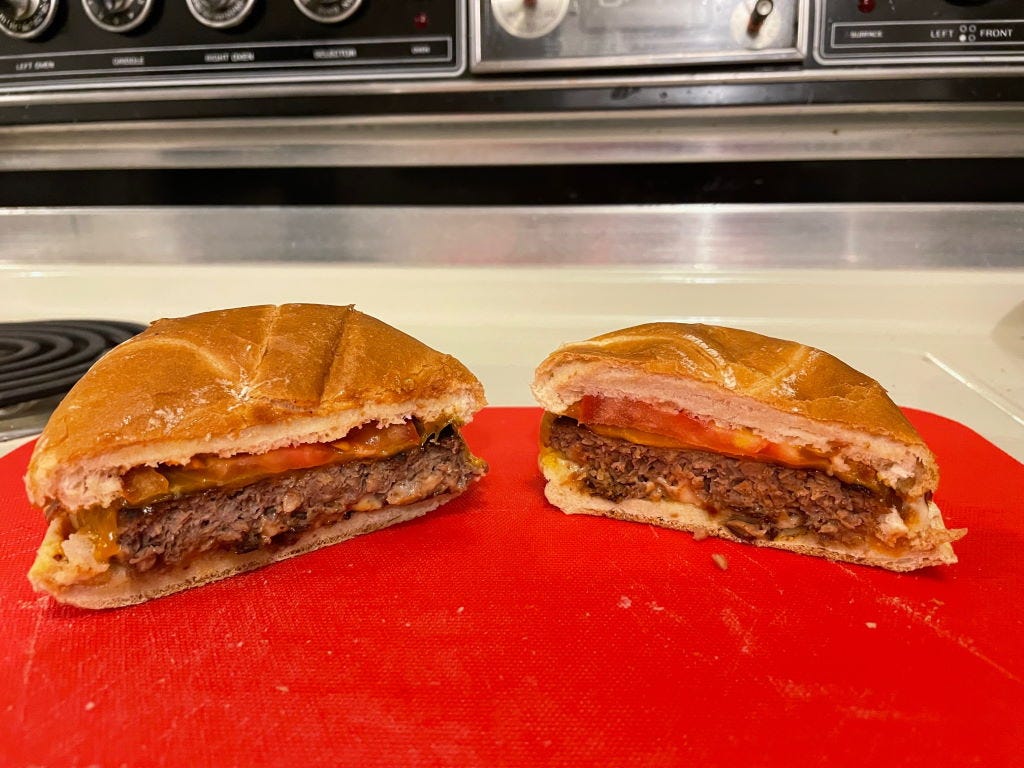The Great Beyond vs. Impossible Burger Taste-Off
A deep-ish dive into the meat-substitute lifestyle.
The benefits of plant-based meat alternatives have been greatly touted over the last few years: Beyond and Impossible have perfected their plant burgers, marketers tell us, both in flavor and in health benefits. Go plant-based, and the planet will thank you.
My views on plant versus meat are a bit more nuanced, though I’m not going to argue against the environmental angle. Picking a plant-based burger over a beef patty reduces CO₂e by around 3,300 grams, the equivalent of a twelve-mile car ride. It’s hard to downplay those kinds of numbers.
How about the health benefits, then?
Fair warning: My opinions are not backed by “formal” medical training.
It’s a bit of hyperbole to claim that plant-based burgers are healthy. For example, both Impossible and Beyond contains roughly four hundred grams of sodium—ground beef and turkey measure about eighty.
If you’re aiming at lowering your calories, turkey holds a hundred and seventy grams compared to the plant burgers’ two hundred and thirty. Even their saturated fats are closer to the beef’s six grams than to the turkey’s two.
Impossible and Beyond do win out on cholesterol, of which they have none. They also have an advantage in fibers, but that number is low, particularly when bringing carbs into the equation.

Of course, the point is moot if you’re a vegetarian looking for proteins. Both Beyond and Impossible have plenty.
The Taste-Off
For the taste-off, I served the plant-based patties as traditional cheeseburgers: Cheddar, mayo, ketchup, and tomatoes. Not exactly gourmet, but a clean way to judge any burger. And frankly—with apologies to the internet’s many opinion-makers—I cannot say Beyond or Impossible are overly different from each other. Nor are they miles away from a baseline beef burger.

I do see why some find Beyond offputting: It has an unpleasant metallic smell when it comes out of the packaging. Cook it, and the odor dies down, but you may have a hard time getting past the initial whiff. Impossible doesn’t really smell like anything.
Scent aside, Beyond marginally edges out Impossible—its texture and flavor are closer to the real thing, if ever so slightly. I still doubt many would notice too much difference if the two weren’t compared side by side. Either is a worthwhile substitute for a basic—though not gourmet—beef cheeseburger.
I’ve always considered a turkey burger different from its traditional beef brethren. It might sound paradoxical, but the plant-based options feel truer to the “real” thing than the turkey does. In that literal sense, Beyond and Impossible are better beef substitutes than turkey, yet you might prefer the latter all the same.
They might not be super healthy, then, plant-based burgers, but with their reduced environmental footprints, they are legit alternatives to beef.
Web Sources
Emily Gelsomin. “Impossible and Beyond: How healthy are these meatless burgers?” Harvard Health Publishing. Updated January 4, 2022. www.health.harvard.edu/blog/impossible-and-beyond-how-healthy-are-these-meatless-burgers-2019081517448
“Climate Burgers: Breaking Down the Science of Plant-Based Meat.” UCLA 100. December 6, 2019. 100.ucla.edu/impact/breaking-down-the-science-of-plant-based-meat

